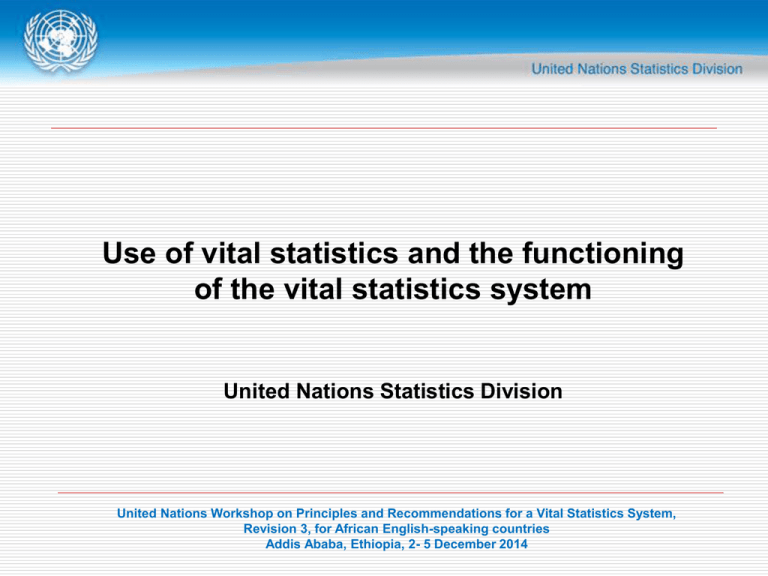Use of vital statistics and the functioning United Nations Statistics Division
advertisement

Use of vital statistics and the functioning of the vital statistics system United Nations Statistics Division United Nations Workshop on Principles and Recommendations for a Vital Statistics System, Revision 3, for African English-speaking countries Addis Ababa, Ethiopia, 2- 5 December 2014 Reading material Principles and Recommendations for a Vital Statistics System, Revision 3, paras. 1-57` United Nations Workshop on Principles and Recommendations for a Vital Statistics System, Revision 3, for African English-speaking countries Addis Ababa, Ethiopia, 2- 5 December 2014 Definition of a vital statistics Vital statistics constitute the collection of statistics on vital events in a lifetime of a person as well as relevant characteristics of the events themselves and of the persons(s) concerned For statistical purposes vital events refer to life and death of the individuals as well as their family and civil status United Nations Workshop on Principles and Recommendations for a Vital Statistics System, Revision 3, for African English-speaking countries Addis Ababa, Ethiopia, 2- 5 December 2014 Definition of vital events Vital events proper Live births Deaths, including foetal deaths Dual events – occurring simultaneously in the lives of two individuals which cannot occur again in the life of either individual without a previous change Marriage (legal partnership, where appropriate) Divorces (legal dissolution of partnership, where appropriate) Annulment Judicial separation Vertical family events involving a descendant Adoption Legitimation Recognition United Nations Workshop on Principles and Recommendations for a Vital Statistics System, Revision 3, for African English-speaking countries Addis Ababa, Ethiopia, 2- 5 December 2014 Uses of vital statistics Knowing size and characteristics of the population – prerequisite to socio-economic planning and informed decisionmaking Monitoring programmes on health care, social security, family planning, maternal and child care, education, nutrition … Estimating size and growth of population Particular emphasis on small areas Use in implementing and evaluating the success of programmes Mortality Life births by weight and place of occurrence Age of mother in terms of family planning programmes Fertility Use in producing development indicators United Nations Workshop on Principles and Recommendations for a Vital Statistics System, Revision 3, for African English-speaking countries Addis Ababa, Ethiopia, 2- 5 December 2014 Definition of a vital statistics system In a context of a system being a set of interacting components Vital statistics system components Legal registration Statistical reporting Collection, compilation and dissemination of statistics United Nations Workshop on Principles and Recommendations for a Vital Statistics System, Revision 3, for African English-speaking countries Addis Ababa, Ethiopia, 2- 5 December 2014 Vital statistics system Live births Health services Complementary/ Interim sources Deaths Fetal deaths Marriages Certification of cause of death Authorized institutions Principles: Divorces Annulments Judicial separations Adoptions Legitimation Recognition Civil Registration, including population registers Courts 1.Compulsory 2.Universal 3.Continuous 4.Confidentiality Judicial institutions National IDs’ Electoral lists Passports … Vital Statistics Compilation Processing Validation Quality control Dissemination Population census Surveys Sample registration areas Additional administrative sources Coronary Police Registries Health records United Nations Workshop on Principles and Recommendations for a Vital Statistics System, Revision 3, for African English-speaking countries Addis Ababa, Ethiopia, 2- 5 December 2014 Sources of vital statistics Critical source – records of vital events derived from civil registration Complementary sources – for evaluation and enrichment of statistics Population censuses Household surveys Additional sources – used in the absence of civil registration and in combination with indirect techniques Questions in population censuses Household surveys Sample registration and health records United Nations Workshop on Principles and Recommendations for a Vital Statistics System, Revision 3, for African English-speaking countries Addis Ababa, Ethiopia, 2- 5 December 2014 Priority in data collection First priority Births Deaths (including causes of deaths) Foetal deaths Second priority Marriages Divorces Third priority Annulments Judicial separations Adoptions Legitimations Recognitions United Nations Workshop on Principles and Recommendations for a Vital Statistics System, Revision 3, for African English-speaking countries Addis Ababa, Ethiopia, 2- 5 December 2014 Principles of a vital statistics system Continuity Short-term fluctuations Seasonality Long-term patterns Confidentiality Fundamental principles of official statistics Personal information used only for statistical purposes Regular dissemination Monthly/quarterly Comprehensive annual tabulations United Nations Workshop on Principles and Recommendations for a Vital Statistics System, Revision 3, for African English-speaking countries Addis Ababa, Ethiopia, 2- 5 December 2014 Organizational structure Legal framework should Assign the function of establishing and operating the system Provide clear designation of duties and responsibilities for Registration Recording Reporting Collection Compilation Analysis Evaluation Presentation Dissemination United Nations Workshop on Principles and Recommendations for a Vital Statistics System, Revision 3, for African English-speaking countries Addis Ababa, Ethiopia, 2- 5 December 2014 Organizational structure (continued) Legal framework should Establish the organizational structure for Management Operation Maintenance Link the production of vital statistics to the civil registration system Designate a central government agency for maintaining the standards for the design and conduct of various operations United Nations Workshop on Principles and Recommendations for a Vital Statistics System, Revision 3, for African English-speaking countries Addis Ababa, Ethiopia, 2- 5 December 2014 Organizational structure (continued) Depending on national circumstances … Centralized and decentralized structure Vital registration part of official statistics Vital registration separate from official statistics Role of courts Role of health institutions Protocols for ensuring quality of statistics United Nations Workshop on Principles and Recommendations for a Vital Statistics System, Revision 3, for African English-speaking countries Addis Ababa, Ethiopia, 2- 5 December 2014 Integration, coordination and collaboration Principles for coordination Uniform legislation and regulations Identical definitions of vital events Statistical concepts, classifications and definitions Consistency between the numerator and denominator Implementation of international standards Inter-agency coordination committee Coordination within the system Communication (conferences, workshops, training courses …) Evaluation Professional association (statisticians/registrars/health workers) United Nations Workshop on Principles and Recommendations for a Vital Statistics System, Revision 3, for African English-speaking countries Addis Ababa, Ethiopia, 2- 5 December 2014 Quality assurance and assessment Strategies and procedures for ensuring the quality of vital statistics At each operational stage Regular and routine Quality of vital statistics is measured by: Completeness Correctness or accuracy Availability Timeliness United Nations Workshop on Principles and Recommendations for a Vital Statistics System, Revision 3, for African English-speaking countries Addis Ababa, Ethiopia, 2- 5 December 2014 In-depth sample surveys Important role within the vital statistics system Complement vital statistics derived from civil registration by providing information that Cannot be collected efficiently through the civil registration Is required only at long time intervals United Nations Workshop on Principles and Recommendations for a Vital Statistics System, Revision 3, for African English-speaking countries Addis Ababa, Ethiopia, 2- 5 December 2014




